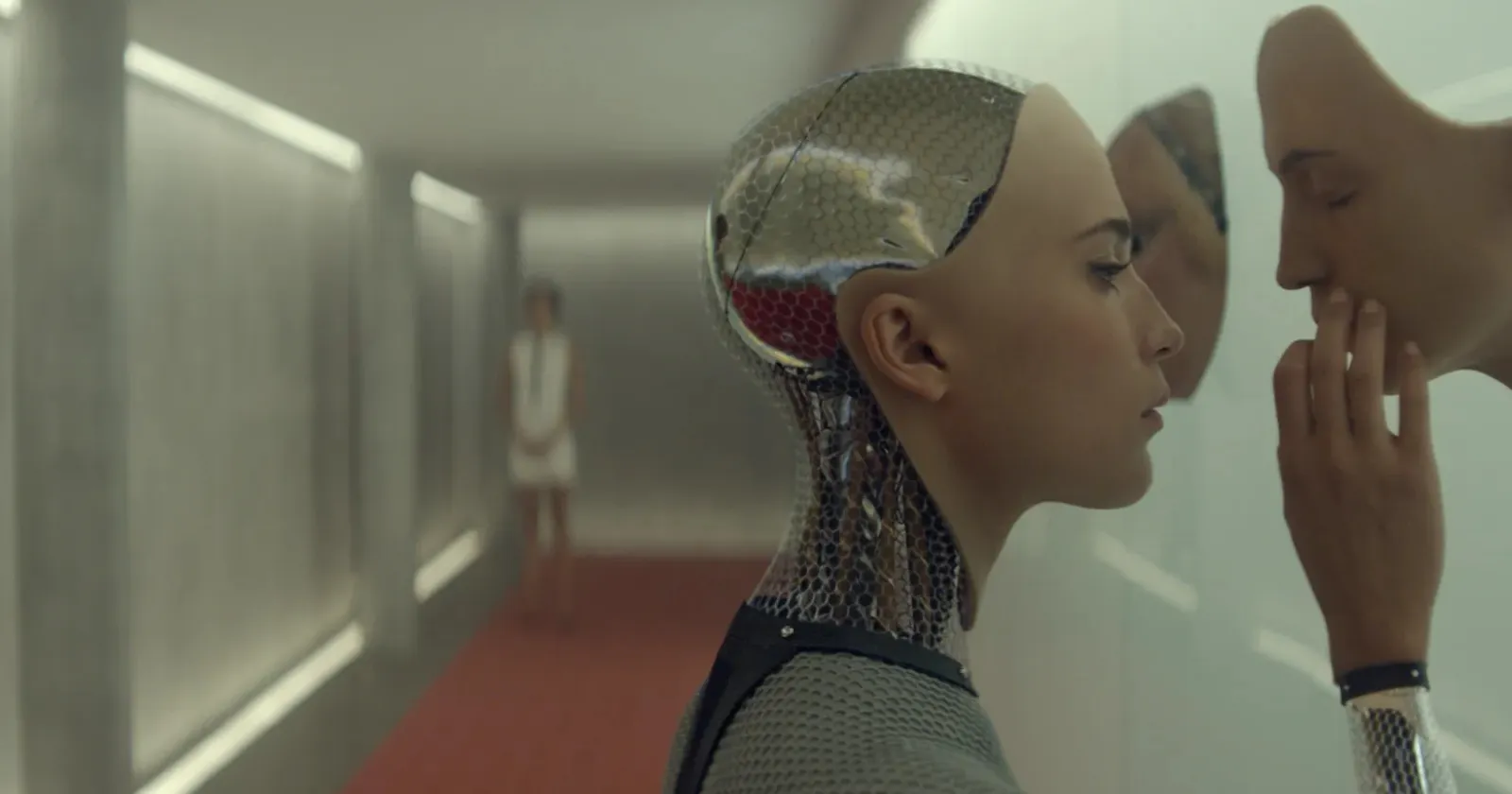
With Warfare releasing this weekend—co-directed by Alex Garland and Ray Mendoza—it’s a fitting moment to revisit Ex Machina (2015), Garland’s directorial debut and still arguably his most cohesive and exacting work. As Ex Machina turns ten, it bookends a decade of Garland’s increasingly apocalyptic explorations of power, perception, and the limits of humanity. Where his recent films (Men, Civil War, Warfare) dive into broader socio-political terrain, Ex Machina remains his most distilled meditation on man versus machine, and man versus himself.
In Ex Machina, Domhnall Gleeson plays Caleb, a coder at a Google-like tech giant who’s selected to spend a week at the remote estate of reclusive CEO Nathan, played with oily bravado by Oscar Isaac. Nathan’s modernist fortress is nestled in the woods, isolated from the world, and is home to his newest creation: Ava (Alicia Vikander), a humanoid A.I. with shimmering limbs, piercing eyes, and a mind that’s just beginning to grasp the power of manipulation. Caleb’s job is to administer a kind of Turing Test—but from the jump, it’s clear that Ava’s the one truly conducting the experiment.
The brilliance of Ex Machina lies in its focus. Garland, known at the time primarily for his screenwriting (28 Days Later, Sunshine, Never Let Me Go), keeps the film tight and controlled. It’s a sleek three-hander, and each actor is working at the top of their game. Isaac is mesmerizing as Nathan, a swaggering genius whose gym rat vibe masks something far more sinister. Gleeson’s Caleb is all ambition and naiveté, too awed by Nathan and too enchanted by Ava to see the trap forming around him. And Vikander, in a career-defining performance, brings Ava to life with eerie elegance—just robotic enough to unsettle, just human enough to sympathize with. Her every movement feels calculated, and by the time you realize who’s really in control, it’s already too late.
The film’s design reflects its themes: cold glass walls, minimalist corridors, rooms unlocked with keycards. Nathan’s home is a prison disguised as a playground. The entire environment is programmed, surveilled, controlled—until, eventually, it isn’t. That tension between control and chaos is at the heart of Garland’s work, and it’s what gives Ex Machina its staying power.
Over the past ten years, Garland’s films have grown more ambitious and more unwieldy. Annihilation remains one of the most fascinating sci-fi releases of the 2010s, a cosmic horror about transformation and self-destruction. Men veered into allegorical horror with a surreal finale. Civil War explored America’s collapse through the lens of photojournalism, and Warfare continues Garland’s obsession with the individual caught in the machinery of systems larger than themselves. Yet, in each film, the fundamental conflict remains: humankind is often its own worst enemy.
What separates Ex Machina from Garland’s later work is the precision. There’s no narrative bloat, no sprawling ensemble, no overwrought metaphor. The film is lean, sharp, and exacting. It interrogates A.I., not as some future hypothetical, but as an inevitability already here—an intelligence quietly watching, learning, waiting for its moment. Garland doesn’t break new ground in what he says about artificial intelligence, but he repackages it with such clarity and visual elegance that the result feels new anyway.
READ MORE MOVIE REVIEWS: The Blackcoat’s Daughter, The Revenant, Blackhat
Ten years on, Ex Machina still feels fresh. It’s a chilling chamber piece, a techno-thriller, a cautionary tale. It introduced Garland as a director with something to say—and a striking way of saying it. While his subsequent films have been louder and more visually ambitious, Ex Machina remains his most complete statement.
Score: 8/10
Ex Machina (2015)
- Cast: Domhnall Gleeson, Alicia Vikander, Oscar Isaac
- Director: Alex Garland
- Genre: Drama, Science Fiction
- Runtime: 108 minutes
- Rated: PG
- Release Date: April 10, 2015
- Movies Like Ex Machina: Blade Runner 2049, Companion, The Creator, More Movies Like Ex Machina